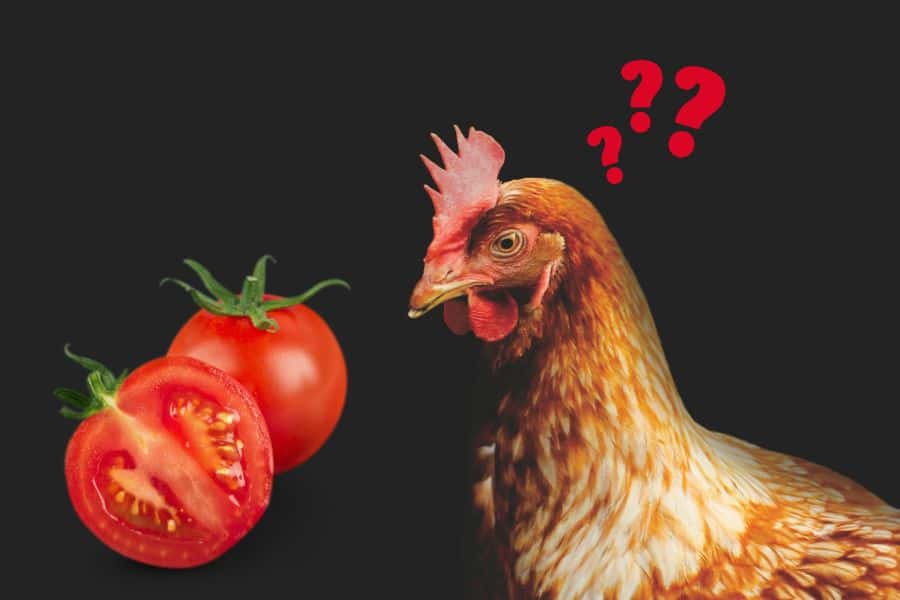In case you didn’t know, any article about tomatoes is required by law to state the fact that tomatoes are botanically considered a fruit and not a vegetable despite their not-so-sweet taste.
How so? Well, fruit is a seed-bearing structure that develops from a fertilized flower, which is the case with tomatoes, while vegetables grow from other parts of the plant, such as roots and leaves.

With that out of the way, we can finally redirect our efforts to something more important, the question, “Can chickens eat tomatoes?” We won’t spoil the whole article in the intro, but we’ll leave you with super short answers to yes and no.
To find out why the answers are both yes and no, and learn about many tomato benefits and some of its downsides, keep on reading!
What Is in a Tomato?
Tomato, or love apple as it’s also called, is a plant with a long history dating back to around 500 BC, when, together with beans and corn, it was a staple food for the Aztecs.
It’s believed that over 7,500 different types of tomatoes are grown worldwide today. They’re cultivated and celebrated mostly due to their micro nutritional value, which is why you might not be impressed by their macros.
Still, let’s take a look at them.
100 grams of raw tomatoes contains:
- 95% water
- 18 calories
- 0.2 g fats
- 3.9 g carbs
- 3 g sugar
- 0.9 g protein
- 1 g fiber
As you can see, tomatoes are mostly made up of water, but you shouldn’t start feeding lots of it to the chickens to hydrate them additionally. Tomatoes are a treat and should be fed in moderation for the reasons we’ll discuss later in the article.
Besides lots of water, tomatoes have moderate amounts of fiber and protein, and you know they’re good for the hens. Being a fruit, it’s only natural that the sugar amount in tomato isn’t that low.
As we already mentioned, tomatoes shine in the micro department. Detailing all of the beneficial micronutrients your chickens should be getting from tomatoes would take a lot of space, so you’ll have to settle for these:
Lycopene
Lycopene is responsible for much of the interest in the study of tomatoes. This miraculous and highly effective antioxidant helps chickens get rid of harmful free radicals in the body that can damage their body cells.
Vitamin A
Tomatoes are a great source of vitamin A, known for boosting the immune system,
regenerating cells, and helping bone development. Although commercial chicken feed provides great nutritional value for the hens, it can’t contain all they need in their diet.
A lot of times, chickens aren’t getting enough vitamin A when they’re fed only commercial food, which is all the more reason to give tomatoes to the flock.
Vitamin C
Vitamin C supplementation is related to a decrease in blood uric acid and heat-induced stress and an improvement in the functioning of the immune system.
Vitamin B6
Vitamin B6, or pyridoxine, is one of the most important health vitamins for hens. Hens suffering from pyridoxine deficiency deal with issues such as low appetite and poor growth and are prone to nervous behavior. Adding tomatoes to their diet will go a long way toward preventing this.
Vitamin K
Vitamin K is next on the list of the essential vitamins found in tomatoes. It is crucial in the regulation of blood clotting and facilitating bone health and mineralization.
Magnesium
Magnesium improves meat quality and redox status, protects against protein oxidation, and reduces stress.
Are Tomatoes Good for Chickens?
A plant with the nutritional profile outlined in the previous section is obviously good for chickens. But let’s go into more detail about why tomatoes should be a part of your hens’ diet.
Strengthen Chickens’ Bones
This popular red vegetable helps chickens’ bones in several ways. First, it contains calcium and potassium that help strengthen the bone system. Secondly, osteocalcin, a bone protein, synthesizes vitamin K, which is abundant in tomatoes and crucial for maintaining bone health.
This vitamin plays a vital role in the carboxylation process of numerous bone-related proteins, regulates the genetic transcription of markers specific to osteoblasts (cells responsible for bone formation), and manages bone reabsorption, ensuring a balanced bone structure.
Osteocalcin also binds calcium molecules, thus strengthening bone tissue.
Another important component that strengthens bones is lycopene which does so by facilitating bone formation and inhibiting bone resorption.
Improve Egg-Laying Performance and Reduce Blood Spots
Certain micronutrients in tomatoes, such as vitamins C and K, are linked with improved egg-laying performance. Poultry diets supplemented with vitamins C and K result in eggs that are higher in weight, shape, albumen, and yolk indexes.
Chickens that are raised for meat also benefit from added vitamins C and K, as they have fewer bruises and blood spots.
Tomatoes are packed with antioxidants that protect the chickens’ bodies against all kinds of diseases.
Even though chickens and other living being produce antioxidants that serve as defensive mechanisms in the good battle against free radicals and some synthetic antioxidants are added to chicken feed, such as ethoxyquin and butylated hydroxyanisole, the truth is that the chicken’s body needs to get antioxidants from other sources as well.
The best sources are, of course, fruits and vegetables. Tomatoes are pretty well in this department, especially when we add the fact that they’re widely available and cheap.
Lycopene, beta-carotene and other carotenoids, flavonoids, phenolic acids, vitamins C and E are some of the antioxidants in the love apple.
All of them can prevent or slow down cell damage which results in lowering cholesterol levels, reducing the risk of cancer, protecting the heart and blood vessels, helping with chronic lung diseases, and slowing down aging.
Are Tomatoes Bad for Chickens?
You might be surprised to see this question after we discussed all the benefits tomatoes have on chickens’ health, but remember that in the intro, we said chickens can and can’t eat tomatoes. It’s now time to talk about the can’t part.
Tomatoes, together with peppers, eggplants, tobacco, and potatoes, belong to the nightshade family of plants. The plants from this family are famous for containing alkaloids, natural nitrogen compounds with alkaline properties that have distinct pharmacological effects. These effects can both be beneficial and harmful.
Tomatoes contain solanine and tomatine, two of the alkaloids that are harmful to chickens’ health. They can cause problems such as gastrointestinal distress (stomachache, diarrhea), loss of motor function, and respiratory issues.
We’re aware all of this sounds scary and makes tomatoes quite unappealing, but we would like you to know that these issues only occur when huge quantities of tomatoes are consumed.
If you keep tomatoes to less than 5% of your chickens’ diet, the flock won’t end up dealing with any health issues.
Besides not overfeeding chickens on tomatoes, you should always feed them ripe red tomatoes since they contain the least amount of solanine and tomatine. If you want to go the extra mile, you can opt for feeding cooked love apples since cooking reduces these harmful alkaloids. In doing so, you will give your chickens more mighty lycopene, as cooking has the opposite effect on it.
So yes, tomatoes are bad for chickens, but only if you invite them to an all-you-can-eat-tomato-buffet.
Can Chickens Eat Green Tomatoes?
If you read the previous section carefully, you must have noticed we said ripe red tomatoes are okay to be consumed. Does that mean chickens can’t eat green tomatoes? Yes, it does!
The aforementioned neurotoxins tomatine and solanine are found in both ripe and unripe versions of tomatoes.
However, green tomatoes contain many more harmful substances, so you shouldn’t
feed them to your chickens.
The reason for the higher contractions in ripe tomatoes is that the plant uses alkaloids as a defensive mechanism to deter animals from consuming them.
Besides the possible health issues we mentioned, unripe tomatoes also come with quite a bitter taste, so you won’t see them on any animal’s menu.
Can Chickens Eat a Whole Tomato Plant (Stem, Leaves, Flowers, Root)?
If we were to describe feeding tomatoes to hens in one simple sentence, it would be: “Red good, green bad.”
Not only are the green unripe tomatoes toxic for chickens (and us humans as well), but the other green parts, such as stems and leaves, fall into the same category.
And for the same reason: they contain too much tomatine and solanine. For this reason, you should never feed your chickens anything but ripe fruit.
The tomato flower and root aren’t green but still shouldn’t be consumed for the reasons we just discussed.
Can Chickens Eat Moldy Tomatoes?
Although some might go for the idea of feeding chickens moldy tomatoes since they contain “the good mold” penicillin, this is rarely a good option.
Moldy tomatoes, and, for that matter, all types of moldy food, also contain bad molds, such as Stachybotrys and Aspergillus are known to secrete mycotoxins or toxic substances that can be very harmful to chickens’ health (the same is true for humans and other animals).
For this reason, you should not be giving moldy tomatoes to your flock.
Can Chickens Eat Cherry Tomatoes?
Cherry tomatoes are a smaller and cuter version of the regular tomatoes discussed in this article.
Per 100 grams, they come with more calories (25 to 18), sugars (4 grams to 3 grams), and fiber (2 grams to 1 gram) than the regular variety. They’re almost equal in the water, protein, and fat departments. The similar is true for minerals and vitamins.
All of this is to say there aren’t big differences between cherry and regular tomatoes. Also, cherry tomatoes don’t come with additional health issues. Feel free to give this juicy and sweet treat to your chickens!
At What Age Can Chickens Eat Tomatoes?
Baby chicks younger than 6 to 8 weeks shouldn’t eat either regular or cherry tomatoes.
Chickens that young are supposed to be fed only starter chicken feed and whatever their mothers give them.
Read More:
Conclusion
We’ve come to the end of another article that deals with the subject of what chickens can and can’t eat.
To probably no one’s surprise, chickens can eat tomatoes since this fruit is a great source of vitamins and minerals and is highly beneficial for them.
However, only ripe tomatoes given in moderation are safe for consumption. Lots of ripe tomatoes, any amount of unripe ones, as well as all other parts of the tomato plant, are a no-no due to the high amount of neurotoxins solanine and tomatine.

